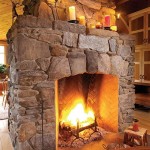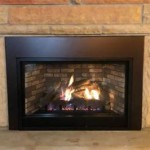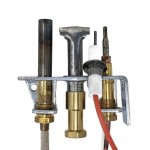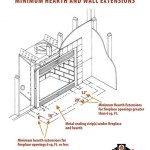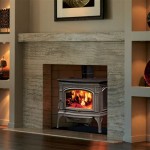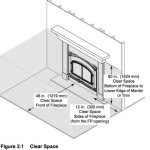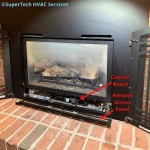Converting a Wood Fireplace to Gas: A Comprehensive Guide
For homeowners seeking the ambiance and warmth of a fireplace without the hassle and mess of wood-burning, converting to gas is an attractive option. Gas fireplaces offer a clean and efficient alternative, providing a similar aesthetic appeal with greater convenience and safety. However, converting a wood fireplace to gas requires careful planning and consideration. This guide will delve into the process, covering essential factors, potential benefits, and key steps involved.
Understanding the Conversion Process
Converting a wood fireplace to gas involves replacing the existing firebox and hearth with a gas-powered unit. This typically entails installing a gas line, vent system, and a new fireplace insert or log set. The specific steps and materials required will depend on the existing fireplace design, desired functionality, and local building codes. There are two primary types of gas fireplace conversions: direct-vent and vent-free.
Direct-Vent
Direct-vent gas fireplaces utilize a sealed system that draws combustion air from the outside and expels exhaust gases directly outdoors. This method offers greater efficiency and reduced indoor air pollution compared to vent-free options. However, it requires a dedicated vent pipe running to the exterior, necessitating potential structural modifications.
Vent-Free
Vent-free gas fireplaces, as their name suggests, do not require a vent or chimney. They exhaust combustion gases directly into the room, relying on a built-in oxygen depletion sensor to shut off the fireplace if oxygen levels fall below a safe threshold. While vent-free fireplaces are simpler to install, they are generally less energy-efficient and may not be suitable for all homes.
Benefits of Converting to Gas
Converting a wood fireplace to gas offers several advantages, making it a desirable choice for many homeowners.
Enhanced Convenience and Efficiency
Gas fireplaces eliminate the need for chopping, storing, and transporting wood, simplifying the overall fire-building process. They ignite instantly with a simple switch, providing immediate warmth and a cozy atmosphere. Gas fireplaces also operate with higher efficiency compared to wood-burning, translating to lower fuel costs and reduced environmental impact.
Increased Safety and Cleanliness
Gas fireplaces are safer than wood-burning units, eliminating the risk of flying embers, potential chimney fires, and the release of harmful smoke and particulate matter into the home. They also produce minimal ash residue, significantly reducing cleaning requirements.
Control and Customization
Modern gas fireplaces offer advanced control options, allowing for precise temperature adjustments and customizable flame patterns. Remote control functionalities and programmable thermostats provide enhanced comfort and convenience, enabling users to set desired temperatures in advance.
Step-by-Step Conversion Process
Converting a wood fireplace to gas involves several key steps, ensuring a seamless transition to a gas-powered fireplace. The exact procedures may vary depending on specific circumstances, so consulting with a qualified professional is highly recommended.
1. Assess Existing Fireplace and Determine Requirements
Begin by carefully examining the existing fireplace structure, considering factors like size, flue dimensions, and structural integrity. Determine the desired gas fireplace type (direct-vent or vent-free) based on home size, ventilation capabilities, and personal preferences.
2. Obtain Necessary Permits and Inspections
Consult with local authorities and building codes to obtain any necessary permits and inspections for the conversion project. This step ensures compliance with safety regulations and prevents potential issues or delays down the line.
3. Secure Gas Line Installation
A qualified gas technician must install a dedicated gas line to supply the fireplace. This may involve running a new line from the main gas meter or tapping into an existing line, taking into account safety regulations and code requirements.
4. Install Gas Fireplace Insert or Log Set
Once the gas line is in place, install the chosen gas fireplace insert or log set. Ensure proper fit and compatibility with the existing fireplace structure, considering factors like dimensions and venting requirements.
5. Connect Gas Line and Venting System
Connect the gas line to the gas fireplace insert or log set, ensuring tight and secure connections. If using a direct-vent fireplace, install the necessary venting system, ensuring proper routing and termination to the exterior.
6. Final Inspection and Activation
After completion, a qualified gas technician must inspect all connections, venting, and safety elements, ensuring proper operation and compliance with regulations. Once approved, the new gas fireplace can be activated and enjoyed safely.
Converting a wood fireplace to gas is a worthwhile investment offering convenience, efficiency, and safety improvements. However, the process requires careful planning, professional expertise, and adherence to local building codes. By understanding the key steps and considerations, homeowners can achieve a seamless transition to a modern and enjoyable gas fireplace experience.
Converting A Wood Burning Fireplace Into Gas Heat Glo
Can I Convert My Wood Burning Fireplace To Gas Woodlanddirect Com

Convert From Wood To Gas With A Insert The Kernel Burner

Wood To Gas Fireplace Conversion In Wisconsin Free Quote Badgerland Waesha

Wood Fireplaces Gas Conversion That Counts

Converting Wood Fireplace To Gas Valparaiso In Northwest Chimney

Wood Burner Conversion New Jersey Fireplaces Kjb
Can I Convert My Wood Burning Fireplace To Gas Woodlanddirect Com

What S The Cost To Convert A Wood Fireplace Gas Orange County Register

Convert Your Wood Burning Fireplace To Propane Ny

